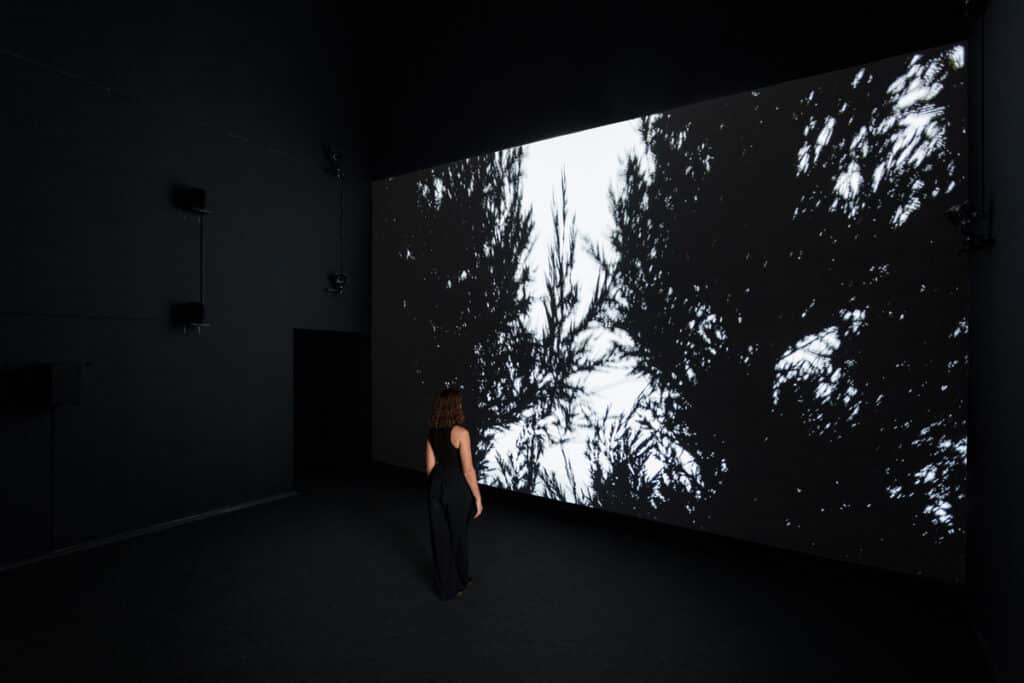Dennis Del Favero. Juried Artist
Constellations
Installation at QUT Kelvin Grove
Artist Statement
Penumbra is an AI immersive art installation exploring the visualisation of an unpredictable ex-treme wildfire scenario using a pyro-aesthetic, namely an aesthetic based on the violent qualities of extreme wildfire. These new generation of fires, recently seen in Maui, are extreme in their speed and scale. They are unpredictable as they traverse terrains in unforeseen ways, unlike the linear and predictable paths of bushfires.
Penumbra 2.0 investigates this pyro-aesthetic as a two-way dialogue between the viewer and a fire-laden landscape, rather than a linear relationship between an active human protagonist and a passive “natural disaster”. It aims to model the uncertainties that characterize such exchanges. On the one hand, the unanticipated actions of the user, and on the other, the fire’s unforeseen behav-ior. As the user traverses the landscape, they attempt to control their perspective through their movement and orientation of gaze. The fire responds in autonomous ways by changing its behavior. Conversely, unexpected changes in the wildfire induce shifts in the user’s actions as they attempt to address the uncertainty.
About the artists
Dennis Del Favero’s installation art utilizes interactive computer graphic systems to explore the relationship between human and climate systems. It has been widely exhibited in major group exhibitions, including Battle of the Nations War Memorial Leipzig (joint project with Jenny Holzer), Film Cologne, International Film Festival Amsterdam, Kunstmuseum Bonn, Biennial of Seville, SIGGRAPH, ISEA, Sydney Film Festival, Tokyo International Forum; and in solo exhibitions in museums and galleries such as Nikolaj Contemporary Art Centre (Copenhagen), Sprengel Museum (Hannover), Neue Galerie Graz, Münchner Stadtmuseum, ViaFarini Milan and ZKM (Karlsruhe). He is currently an Australian Research Council Laureate Fellow, Chair Professor of Digital Innovation and Director of the iCinema Research Centre at the University of New South Wales (Sydney, Australia), Visiting Senior Research Fellow at the University of California (Santa Barbara, USA), Visiting Professor at IUAV University of Venice, and Editorial Board Member of Studio Corpi (Italy). His work is represented by Galerie Brigitte Schenk, Cologne and Kronenberg Mais Wright, Sydney.
Charles Green’s work investigates contemporary international and Australian art, artists collabora-tions with a current focus on problems of conflict. It has been widely published with 4 books, edited 6 books, published 56 research book chapters, 22 journal articles 200 essays and reviews in profession-al journals and exhibition publications world-wide, 52 solo exhibitions and 58 curated exhibitions.
Yang Song’s work current research explores deep learning and data science in relation to extreme events applying AI to visualising extreme fire dynamics with over 150 peer-reviewed publications in-cluding papers in TMI, MedIA, TIP, NeuroImage, BMC Bioinformatics, CVPR, ICCV, AAAI, IJCAI, and MICCAI.
Khalid Moinuddin’s current research involves computational work in the area of combustion, flame growth and propagation, tunnel fire and fire risk analysis with 71 articles, 43 conference papers and 15 policy reports including for International Journal of Wildland Fire, MODSIM International Congress on Modelling and Simulation and Department of Defence.
Credits: Dennis Del Favero, Charles Green, Yang Song, Khalid Moinuddin, Alex Ong, Navin Brohier, Lara Clemente, Scott Cotterell
URL: icinema.unsw.edu.au

